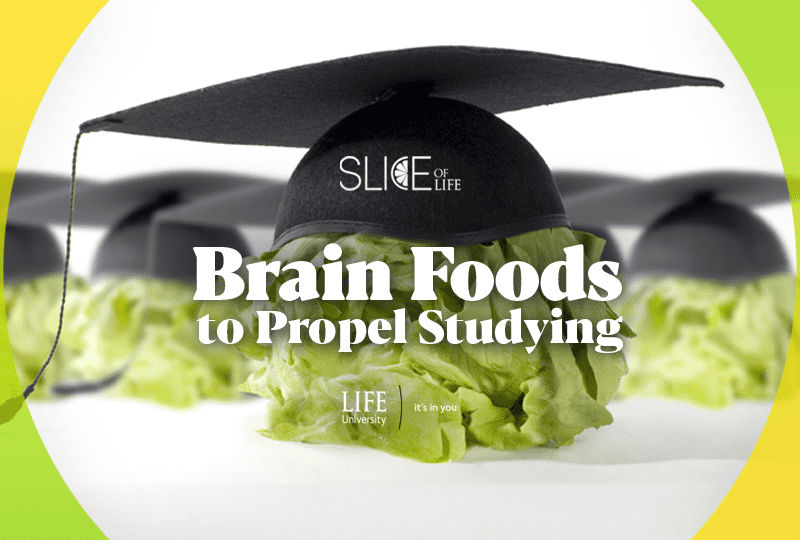Brain Foods to Propel Studying
Ultimate success as a Life University (Life U) student requires diligent study and many hours hitting the books, but if students don’t take proper care of themselves, they can find themselves hitting a wall instead. There are many forms that necessary self-care can take, but today we will focus on the need for a balanced diet to help give students enough sustainable energy to take in and retain important information.
It’s tempting to reach for comforting junk food in times of stress. Cheetos or Oreos, anyone? Though of course in moderation, it is perfectly fine to indulge in an occasional unhealthy snack, it is imperative to base the bulk of our diets on foods that will healthfully fuel us.
5 Major Brain Foods
As outlined in Harvard Health’s article titled “Food linked to better brainpower,” there are five major types of brain foods that it would be wise for a Life U student to include in their diet on a regular basis, which are (in no particular order):
- Leafy green vegetables- Think vegetables like kale, spinach, collards and broccoli. These foods are rich in brain-healthy nutrients like vitamin K, lutein, folate and beta carotene. Research suggests these vegetables may slow cognitive decline as well.
- Fish high in omega-3 fatty acids- Omega-3 fatty acids are healthy unsaturated fats linked to lower blood levels of beta-amyloid, the protein that forms damaging clumps in the brains of people with Alzheimer’s disease. Ideally, including fish at least twice a week in a diet is good, but be careful to choose options low in mercury, like salmon, cod, canned light tuna or pollack. An omega-3 supplement can also be a useful alternative, as well as consuming avocados, flaxseeds and walnuts.
- Walnuts- Nuts in general prove to be excellent sources of protein and healthy fats, with one type of nut most associated with improved memory. A 2015 study from UCLA linked higher walnut consumption to improved cognitive test scores. Walnuts are high in a type of omega-3 fatty acid called alpha-linolenic acid (ALA). Diets rich in ALA and other omega-3 fatty acids have been linked to lower blood pressure and cleaner arteries, which is good for both the heart and brain.
- Berries- Have you ever heard of Flavonoids? Flavonoids are the natural plant pigments that give berries their brilliant color, and they also help improve memory, research shows. A study conducted by researchers at Harvard’s Brigham and Women’s Hospital found that women who consumed two or more servings of strawberries and blueberries each week delayed memory decline by up to two-and-a-half years.
- Coffee or tea- A morning cup of tea or coffee might offer more than just a short-term boost. In a 2014 study published in The Journal of Nutrition, participants with higher caffeine consumption scored better on tests of mental function. Caffeine might also help solidify newer memories, according to other research. Investigators at Johns Hopkins University asked participants to study a series of images and then take either a placebo or a 200-milligram caffeine tablet. More members of the caffeine group were able to correctly identify the images on the following day compared to the control group.
Of course, too much caffeine can be dangerous and should be avoided. According to the Mayo Clinic, a maximum amount of 400 milligrams of caffeine a day, roughly four standard cups of coffee, is considered safe. If you consume too much caffeine, it can cause unwanted symptoms such as headache, insomnia, nervousness, fast heartbeat and more.
Slice of LIFE is an invitation to and extension of everything happening at Life U. Whether you are a current student, a potential freshman or a proud alumni, Slice of LIFE can help keep you connected to your academic community. Know of a compelling Life U story to be shared, such as a riveting project, innovative group or something similar? Let us know by emailing Marketing@life.edu.
For more information about Life U’s Nutrition program, visit life.edu/academic-pages/college-of-graduate-and-undergraduate-studies/nutrition-bs/


Social Media